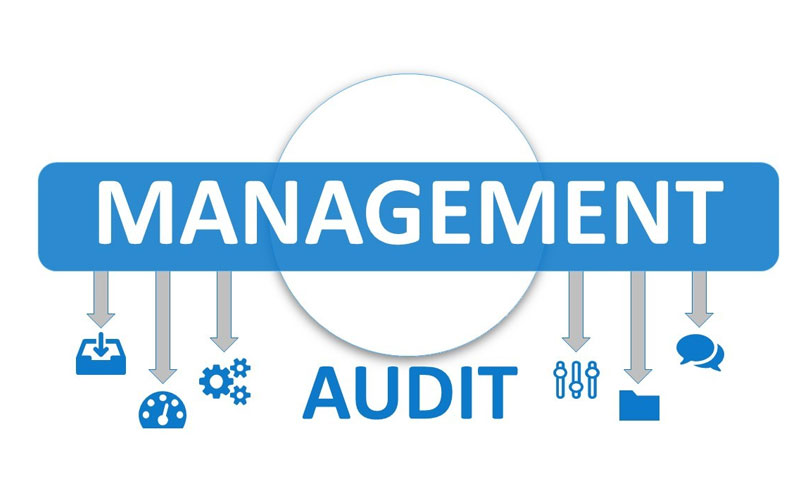Management Audit

Management Audit
In today’s dynamic business environment, organizations are constantly under pressure to improve operational efficiency, enhance governance, and drive sustainable growth. While financial audits evaluate the accuracy of financial records, they often fail to assess the effectiveness of management practices. This is where Management Audit plays a critical role.
A Management Audit is a comprehensive and objective evaluation of an organization’s management processes, performance, and effectiveness. It ensures that managerial policies, decisions, and practices are aligned with strategic objectives and industry best practices.
Our firm specializes in delivering end-to-end Management Audit services to help organizations strengthen leadership practices, optimize operations, and foster a culture of accountability.
Meaning of Management Audit
A Management Audit is an independent, systematic examination of decisions, procedures, and performance of the management of an organization. Unlike statutory audits that focus on financial accuracy, a management audit evaluates the efficiency, effectiveness, and adequacy of the managerial processes and controls within an organization.
It provides stakeholders with a clear understanding of how well the management is utilizing the resources and fulfilling its responsibilities.
Objectives of Management Audit
The primary objectives of a Management Audit include:
• Evaluating the effectiveness and efficiency of management in achieving organizational goals.
• Identifying gaps or weaknesses in planning, organizing, controlling, and decision-making.
• Ensuring that corporate policies and procedures are followed and aligned with strategic directions.
• Recommending improvements for better resource utilization, performance, and profitability
• Strengthening corporate governance and accountability frameworks
• Enhancing risk management and internal control mechanisms.
How a Management Audit Works
Our Management Audit process follows a structured and methodical approach, which includes the following steps:
1. Preliminary Assessment
o Understanding the client’s business, structure, and objectives
o Identifying key areas of focus and concerns.
2. Planning & Scope Definition
o Defining audit objectives, criteria, and scope
o Selecting the audit team and developing an audit plan.
3. Data Collection & Analysis
o Conducting interviews with management and staff.
o Reviewing internal documents, policies, and performance reports.
o Observing operational practices.
4. Evaluation
o Assessing management systems, processes, and internal controls.
o Benchmarking against industry best practices.
5. Reporting
o Preparing a detailed Management Audit Report with findings and recommendations.
o Presenting the report to the senior leadership and/or board of directors.
6. 6.Follow-up
o Assisting with implementation of audit recommendations.
o Conducting post-audit evaluations if required.
Management Audit Reports
A Management Audit Report is the primary outcome of a management audit engagement. It serves as a diagnostic tool and a strategic roadmap for organizations to evaluate and improve their managerial performance, systems, and structures. Our reports are designed not just to highlight problems, but to provide actionable insights and solutions tailored to your business.
Our audit culminates in a detailed Management Audit Report, which includes:
• Executive Summary:Key findings and overall evaluation.
• Detailed Observations:Area-wise analysis with supporting evidence.
• Gap Analysis:Comparing current practices with benchmarks.
• Recommendations:Actionable suggestions for performance improvement.
• Implementation Roadmap:Guidance for integrating changes effectively.
FAQs – Management Audit
How is a Management Audit different from a Financial Audit?
A financial audit focuses on the accuracy and fairness of financial statements, while a management audit evaluates the efficiency, effectiveness, and adequacy of managerial processes and decision-making. The goal is performance improvement rather than compliance verification.
Who conducts a Management Audit?
Management Audits are typically conducted by:
Independent audit firms or consultants with expertise in organizational management.
Internal audit teams (in larger organizations) with a focus on managerial effectiveness
How often should a Management Audit be conducted?
It depends on your business size, complexity, and regulatory requirements. However, it’s advisable to conduct a management audit:
Annually for dynamic, high-growth organizations.
Every 2–3 years for stable enterprises.
After major structural or strategic changes (e.g., mergers, acquisitions, leadership changes).
Is the Management Audit confidential?
Absolutely. All audit findings, reports, and communications are treated with strict confidentiality. We follow professional standards and data privacy protocols at every stage.
Can a Management Audit help improve profitability?
Yes. While a Management Audit does not directly influence revenue, it helps identify inefficiencies, resource misallocations, and poor decision-making—all of which impact profitability. By optimizing processes and aligning goals, companies often see cost savings, productivity gains, and long-term profitability improvements.
